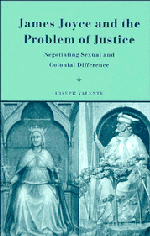Book contents
- Frontmatter
- Contents
- Preface
- Acknowledgments
- List of abbreviations
- 1 Justice unbound
- 2 Joyce's sexual differend: an example from Dubliners
- 3 Dread desire: imperialist abjection in Giacomo Joyce
- 4 Between/beyond men: male feminism and homosociality in Exiles
- 5 Joyce's siren song: “Becoming-woman” in Ulysses
- Epilogue: trial and mock trial in Joyce
- Notes
- Index
Epilogue: trial and mock trial in Joyce
Published online by Cambridge University Press: 08 January 2010
- Frontmatter
- Contents
- Preface
- Acknowledgments
- List of abbreviations
- 1 Justice unbound
- 2 Joyce's sexual differend: an example from Dubliners
- 3 Dread desire: imperialist abjection in Giacomo Joyce
- 4 Between/beyond men: male feminism and homosociality in Exiles
- 5 Joyce's siren song: “Becoming-woman” in Ulysses
- Epilogue: trial and mock trial in Joyce
- Notes
- Index
Summary
The trial is a dominant motif in Joyce's work, the court a recurrent site for the exploration and enactment of gender, racial, and generational politics. Joyce regularly represents juridical or quasi-juridical proceedings to this end throughout his career. At the conclusion of Chapter i, I catalogue the most salient of these trial scenarios - the impromptu trial of Father Dolan in A Portrait, the double trial of Bloom in “Circe,” the Festy King trial and the Anita-Honophurious trial in Finnegans Wake - and I should like to close with an analysis of their rhetorical form and political implications.
Each of these trials represents a strongly parodistic moment in the text, and is represented as a site of comic excess and carnivalesque exaggeration. The boys at Clongowes mimic the address of Roman law in order to mount a mock inversion of the institutional hierarchy of the College, and they punctuate their effort with riotous cheers and gestures that answer to Bakhtin's conception of carnival misrule: a merging into a collective body, a gay parody of authority figures, “festive laughter… gay, triumphant but at the same time mocking and deriding,” the nondistinction of participants and spectators, etc. It is, further, in terms of such holiday misrule, with its reversal of social values, that we can understand the momentary promotion of Stephen Dedalus from locker-room misfit to big man on campus.
- Type
- Chapter
- Information
- James Joyce and the Problem of JusticeNegotiating Sexual and Colonial Difference, pp. 245 - 256Publisher: Cambridge University PressPrint publication year: 1995



